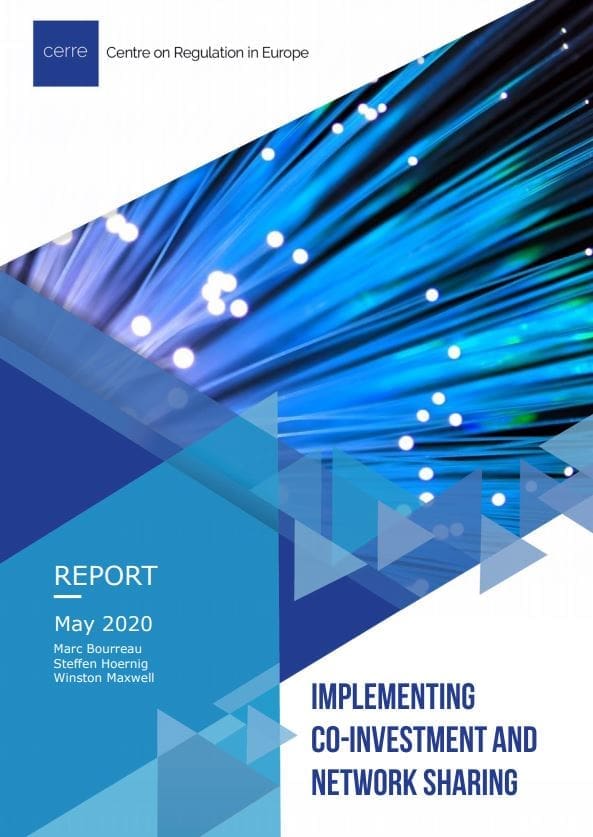This CERRE Telecom report investigates the benefits and drawbacks of telecom infrastructure sharing. The authors, Marc Bourreau, Steffen Hoernig and Winston Maxwell, have analysed the practice in 12 European countries* and provide recommendations to fairly and efficiently implement co-investment & network sharing agreements in Europe.
The new European Electronic Communications Code introduces new regulatory provisions to stimulate investment in next-generation access networks and help to achieve the Gigabit Society targets for the European Union. One of the key new provisions is co-investment for very-high-capacity networks as an alternative to access remedies.
As of today, co-investment agreements for the deployment of fast broadband fixed infrastructures have already been implemented in a few European countries. In France, in urban and suburban areas operators are obliged by existing regulations to open to potential co-investors any new fibre infrastructure that they want to roll out, with different modalities for urban and suburban areas. In Portugal, the regulator has not set up similar obligations, but Vodafone and NOS struck a commercial co-investment deal in 2017 to share dark fibre for around 2.6 million homes. Co-investment agreements have also taken place in Italy, Spain and Switzerland. With the new Code, more co-investment agreements are likely to emerge.
In mobile markets, network sharing agreements are also very common, both mandated and voluntary, and can take different forms, ranging from sharing of cell sites to sharing of Radio Access Networks (RANs) and spectrum. The deployment of the new 5G mobile technology makes it necessary for operators to share even more of their infrastructure.
From a public policy point of view, allowing for infrastructure sharing – where infrastructure sharing encompasses both co-investment and network sharing – involves trade-offs. For example, infrastructure sharing allows operators to share costs – e.g., costs to upgrade or deploy networks, but also operating costs – which may improve their ability to invest, improve coverage and accelerate roll-out – a clear benefit. But, on the other hand, there is the concern that in certain circumstances infrastructure sharing agreements may harm competition, for example, by reducing infrastructure-based competition, and hence investment incentives, or by facilitating collusion between co-investors.
The market context (e.g., the market positions of the partners) is a strong determinant of the potential benefits and costs of an agreement. The implementation details of the agreement also matter. The general objective of this report is to discuss the implementation aspects of infrastructure sharing that may affect the trade-off between the benefits of infrastructure sharing, in terms of faster and wider rollout of high-speed networks in particular, and the potential downsides, in terms of reduced investment incentives or softened market competition. We studied the following Implementation aspects: the operational model adopted for infrastructure sharing, whether to regulate or leave the agreement to the market, the interplay between infrastructure sharing and other regulatory provisions, how to price access by late co-investors, and the specificities of infrastructure sharing agreements with business users.
Our analysis shows that from a social point of view, infrastructure sharing has the following potential benefits:
- Sharing of deployment costs, leading to faster and wider coverage and higher quality;
- Sharing of operational costs, leading to lower prices;
- Enhanced competition, benefiting consumers in terms of lower prices;
- Facilitated entry for third-party operators.
In the absence of infrastructure sharing, the counterfactual differs depending on the type of technology (fixed or mobile) and the market context (i.e., the dominance of partners). In the fixed market, with SMP operators, but also under the new co-investment provisions in the EECC, the counterfactual involves some access obligations. For fixed infrastructure sharing with non-SMP operators, where sharing occurs on a voluntary basis, the counterfactual would rather involve no access obligation. In the mobile market, the counterfactual situation would involve no access obligation and most (if not all) nationwide networks investing independently to upgrade their networks.
The market context and the type of technology deployed (fixed or mobile) will affect the magnitude of potential benefits and drawbacks.
The implementation of an infrastructure sharing agreement will also affect the potential benefits and costs of infrastructure sharing. Therefore, we have analysed how an agreement should be implemented to maximize benefits while minimizing potential costs.
Finally, in this report, we discussed the experience in various European countries regarding mobile network sharing and fixed co-investment, with a review of the relevant legal cases when available. The legal cases show that infrastructure sharing agreements are generally viewed favourably by competition authorities as fostering faster network roll-out and increased competition, and that there is not one single form of cooperation that is favoured by competition authorities.
The cases show that infrastructure sharing transactions, regardless of the form, must take the following anti-competitive effects into account:
- The infrastructure sharing involving new network investment should result in more and faster total network roll-out, or more and faster network upgrades, than would otherwise be the case in the absence of cooperation.
- As a general matter, infrastructure sharing with limited geographic scope will create fewer competition concerns than sharing covering large parts of a country; sharing in rural areas will create fewer issues than sharing in urban areas.
- Sharing of passive network elements will raise fewer competition issues than sharing active network elements, such as RAN sharing.
- The pricing of wholesale inputs (passive and active infrastructure, maintenance services) should be analysed both with regard to their impact on the retail pricing strategy of the parties (the risk of price coordination), but also with regard to access prices charged to third party operators (risk of foreclosure).
- Where some party’s incentives are not aligned with its contractual investment or maintenance obligations, there is a significant risk of anticompetitive behaviour regardless of what is written in the contract. Therefore, infrastructure sharing deals should be avoided or carefully scrutinized where there is a mismatch in incentives (for example, if one of the parties already has a cable network in a zone covered by the party’s co-investment commitment).
- Restrictions to third party access to infrastructure should be eliminated or reduced to the strict minimum necessary for the infrastructure sharing involving new network investment to be viable.
- The competitive impact on third party operators of infrastructure sharing will also depend on the existence or not of regulated wholesale access remedies, as well as in co-investment projects the openness to further co-investors.
- Information exchange must be limited to what is strictly necessary, including if necessary the organization of internal Chinese walls.





